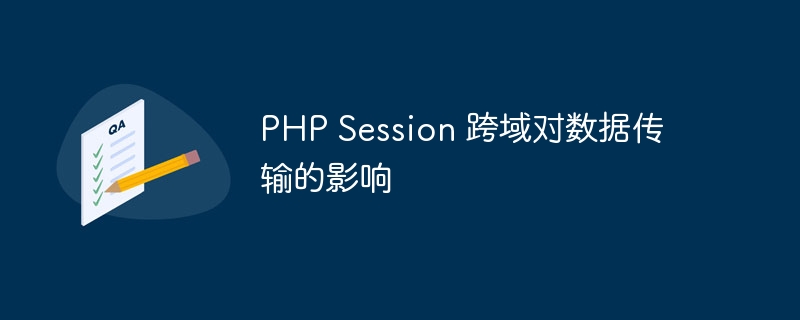Home >Backend Development >PHP Tutorial >The impact of PHP Session cross-domain data transmission
The impact of PHP Session cross-domain data transmission
- WBOYWBOYWBOYWBOYWBOYWBOYWBOYWBOYWBOYWBOYWBOYWBOYWBOriginal
- 2023-10-12 13:51:441316browse

PHP Session The impact of cross-domain data transmission
Session is a mechanism for storing user data on the server side. It plays an important role in web applications. . In PHP, Session can help us transfer user information and data between pages. However, Sessions face some challenges when it comes to cross-domain access.
Cross-domain access refers to accessing web pages of different domain names or subdomains in the browser. In this case, the Session cannot be shared directly due to the browser's same-origin policy. The same-origin policy requires that scripts in web pages can only access resources under the same domain name as their source.
Specifically, when a user accesses a page with Session on domain name A, the server will store the user's information in Session. However, if the user later accesses a page on domain name B, the server cannot directly obtain the user's Session data. This leads to the problem of Session data transmission during cross-domain access.
So, how to deal with the Session data transmission problem during cross-domain access in PHP? Below we illustrate through specific code examples.
First, create a page named "session_test_a.php" on domain name A, the code is as follows:
<?php session_start(); // 开启 Session $_SESSION['user_id'] = 123; // 保存用户信息到 Session // 输出 Session 数据 echo json_encode($_SESSION);
Create a page named "session_test_b.php" on domain name B, The code is as follows:
<?php
session_start(); // 开启 Session
// 打印 Session 数据
var_dump($_SESSION);
// 访问域名A上的 Session 数据
$curl = curl_init();
curl_setopt_array($curl, array(
CURLOPT_URL => "http://domainA/session_test_a.php",
CURLOPT_RETURNTRANSFER => true,
CURLOPT_CUSTOMREQUEST => "GET",
CURLOPT_HTTPHEADER => array(
"Content-Type: application/json",
),
));
$response = curl_exec($curl);
$err = curl_error($curl);
curl_close($curl);
if ($err) {
echo "cURL Error #:" . $err;
} else {
// 输出域名A上的 Session 数据
echo $response;
}In this example, we store the user's information in the Session in the page of domain name A, and output the Session data in JSON format. In the page of domain name B, we first open the session and try to access the page on domain name A to obtain the session data.
It should be noted that in order to achieve cross-domain access, we use the cURL function to perform HTTP requests. Receive the returned data by setting "CURLOPT_URL" to the page address on domain name A and setting "CURLOPT_RETURNTRANSFER" to true. Finally, the Session data on domain name A is obtained through "curl_exec".
Through the above example, we can see that the page on domain name B successfully accessed the page on domain name A and obtained the Session data. This means that we successfully implemented Session data transmission during cross-domain access.
However, there are also some risks when using Session for cross-domain access. Due to the restrictions of the same-origin policy, if domain name B is invaded by others or has a security vulnerability, the attacker may obtain the user's session data through cross-domain access. Therefore, in order to protect user privacy and data security, when using Session for cross-domain access, we need to strengthen security measures and verification mechanisms for domain names.
In summary, PHP Session has a certain impact on data transmission during cross-domain access. By using cURL functions and appropriate security measures, we can transfer session data between different domain names. However, in actual applications, it is necessary to decide how to handle Session data transmission issues during cross-domain access based on specific business needs and security requirements.
The above is the detailed content of The impact of PHP Session cross-domain data transmission. For more information, please follow other related articles on the PHP Chinese website!

